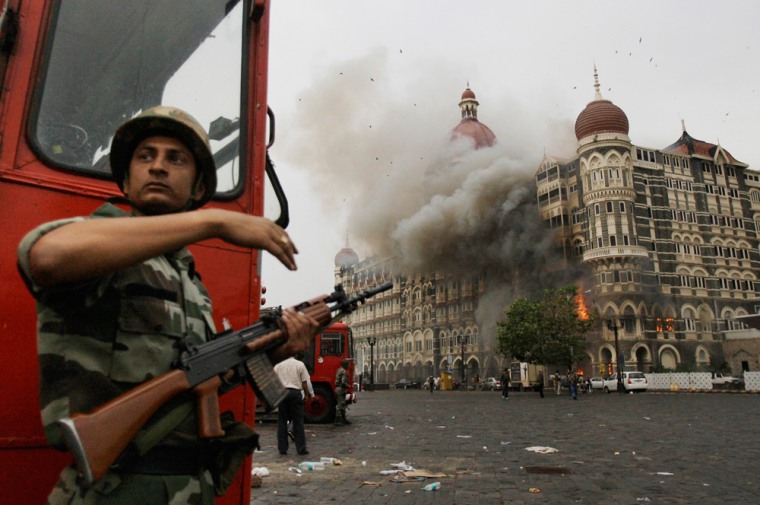India handed evidence Monday to Pakistan that it says links the deadly Mumbai attacks to Pakistani "elements" and called on authorities across the border to investigate further and help bring the culprits to justice.
India has blamed the November attacks that killed 164 people on Pakistani-based militants, but Pakistan has denied the accusations saying India had yet to provide proof.
Foreign Secretary Shivshankar Menon gave evidence to the Pakistani High Commissioner in New Delhi on Monday linking the attacks to "elements in Pakistan," said Foreign Minister Pranab Mukherjee.
The evidence included material from the interrogation of the lone surviving gunman, details of conversations between the gunmen and their alleged handlers in Pakistan, recovered weapons, and data from satellite phones.
"This material is linked to elements in Pakistan," an official statement said. "It is our expectation that the government of Pakistan will promptly undertake further investigations in Pakistan and share the results with us so as to bring the perpetrators to justice."
Pakistan's Foreign Ministry spokesman Mohammed Sadiq said the authorities are reviewing the evidence and declined to comment further.
India blames Lashkar-e-Taiba
India has blamed the three-day siege on Lashkar-e-Taiba, a militant group based in Pakistan, where authorities have arrested at least two men accused of planning the attacks and launched a nationwide crackdown on a charity believed to be a front for Lashkar-e-Taiba.
India has called on Pakistan to hand over the suspects and dismantle the terror network they say is based across the border. Pakistani leaders say they will try any suspects in the attacks in their own courts.
In the wake of the attacks, tensions between the nuclear-armed rivals have been high, with Pakistan redeploying troops toward India and away from the Afghan border, where authorities are battling militants.
Critics say the troop movement will hurt the Pakistani army's attempts to gain control of the lawless tribal region, where on Monday police found three bullet-riddled bodies they say were victims of the Taliban. The victims, found along a road some 16 miles east of Miran Shah, the main town in the North Waziristan tribal region, were a Pakistani construction contractor and two Afghan men the Taliban accused of spying for the United States, said police official Akhtar Salam.
India and Pakistan have fought three wars against each other since they gained independence in 1947, but Indian leaders have made clear they do not want to fight a fourth war. India has been careful not to blame the attacks on the Pakistani government, and Monday's statement again accused "elements in Pakistan," an apparent reference to militant groups.
Conciliatory stance
Pakistan's leaders have recently sought a conciliatory stance. Pakistan's Foreign Minister Shah Mahmood Qureshi said Sunday the country wanted "good relations with its neighbors. Good relations with India is in the interest of Pakistan. Stability in the region will benefit Pakistan."
Much of India's evidence against the militants comes from interrogations of Mohammed Ajmal Kasab, the only gunmen to survive the attacks. He has reportedly told authorities that he and nine others were Pakistani, and that he was trained in Pakistan and that his handlers are still there.
Pakistan has said it has no record of Kasab as a Pakistani citizen.
The Mumbai attacks began Nov. 26 and lasted for nearly three days. The 10 gunmen attacked 10 sites across India's financial capital, including two five-star hotels, the main train station, popular restaurants and a Jewish center.
The U.S. has sent a string of envoys to the region in recent weeks to help defuse tensions. U.S. Assistant Secretary of State Richard Boucher arrived in Islamabad on Monday to meet with top Pakistani government officials, the American Embassy in the Pakistani capital confirmed. Embassy spokesman Lou Fintor declined to give specifics of Boucher's meetings but said "regional issues" would be discussed.
More on | |
